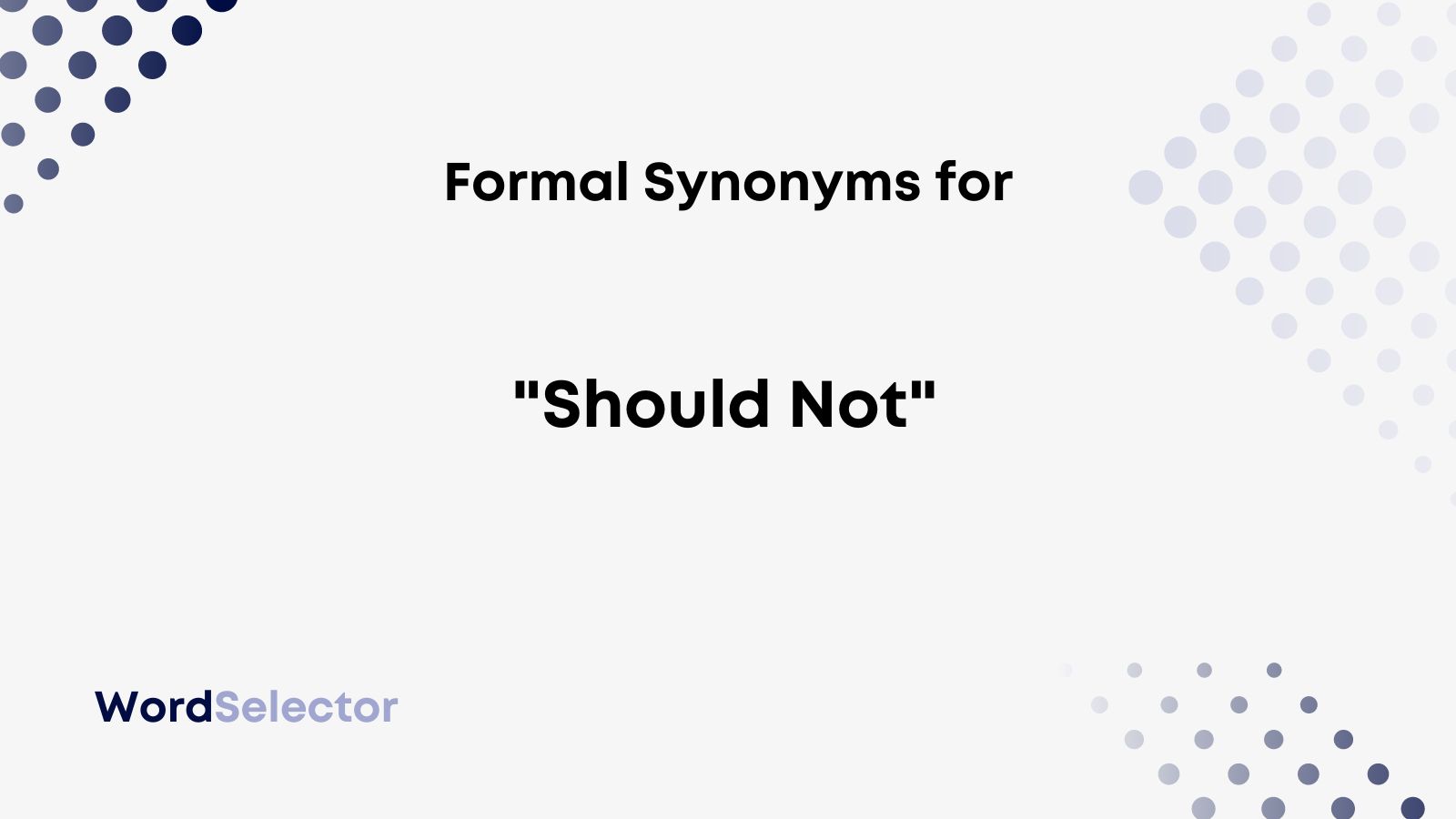Are you trying to figure out what to use instead of “should not” in formal writing?
Maybe you’re worried the phrase itself is rude or unprofessional.
Well, you’ve come to the right place if you’re looking for something different.
After all, this article will explain how to say “should not” professionally.
Should Not Synonyms
- Must not
- Is prohibited from
- Ought not
- Is forbidden to
- Is not to
- Shall not
- Is disallowed to
- Cannot
- Is not permitted
- Is unacceptable to
- Will not
- Is impermissible
- Is precluded
- Shan’t
- Is not allowed to
KEY TAKEAWAYS
- “Should not” is correct and works well when telling someone they can’t do something.
- “Must not” is a great formal synonym if you want to stop someone from engaging in something quickly.
- “Is prohibited from” is another great alternative that keeps things professional and clear.
So, keep reading to learn a better word for “should not.” We’ve touched on the best two synonyms from the list above to give you a better idea of what’s going to work.
Also, the final heading will explain whether it’s correct to say “should not.” You can always skip ahead if you think this is more relevant to your search query.
Must Not
You can use “must not” as another way to say “should not.”
Generally, “must” is more commanding than “should.” So, it makes it clear that you don’t want someone to do something because it’s against the rules or dangerous.
For the most part, this keeps things professional and direct.
You can use it when emailing your team to share company policies. It’s a great way to strike fear in people when you’re trying to forbid them from doing something.
Also, you can review the following email example to learn a bit more about it:
Dear Team,
You must not engage with the competition during this period.
It’s best if we focus on our own work to ensure we are delivering the best results.
Yours,
Judy Montgomery
You can also use this when writing business rules.
If you’re attaching rules to an email that will be sent company-wide, it’s worth using something like this to let people know what they’re not allowed to do.
You can also review the following example if you need more help understanding how it works:
You must not take any holiday without at least one month’s notice. It is very important to us to allow you to arrange cover.
Is Prohibited From
You can also mix things up by writing “is prohibited from.”
This is a professional choice that shows you’ve forbidden people from doing certain things.
Of course, you may change the verb form of “is” to fit the context. For example:
- I am prohibited from
- You are prohibited from
- She is prohibited from
As long as it makes sense for the context, feel free to mix it up.
In this case, we recommend using it when writing to an employee. It’s a good way to tell them they’re not allowed to do something that might reflect badly on you.
Here’s a great email example to give you a better understanding of how it can work:
Dear Max,
I’m afraid you are prohibited from carrying on with this project.
I have found someone else who will be happy to step in and take your part.
All the best,
Kim Tate
You can also use this when writing an essay.
It’s a good choice when explaining actions that someone (or yourself) is not allowed to perform. This could help to put things into perspective for the reader.
Here’s a helpful essay example to show you how it works if you’re still unsure:
I am prohibited from commenting more on this situation. I’ve said all I can about what I believe.
Is It Correct to Say “Should Not”?
It is correct to say “should not.”
It’s formal and shows someone they’re not allowed to do something.
You can refer to the following sample email if you still need help understanding it:
Dear Morris,
You should not compare your stats to those of your peers.
Focus only on your own workload, and we’ll see what you can get from it.
Yours,
Tyler Bennett
Of course, you need to know whether you can contract the words in formal writing.
You should not contract the phrase in formal writing. Contracting it makes it more informal.
For example:
- Formal: Should not
- Informal: Shouldn’t
Feel free to include these extensions in your writing to mix things up:
- Should not be used
- Should not happen
- Should not be taken lightly
- Should not be a problem
- Should not be the case
Don’t leave without bookmarking this page, though! After all, you never know when you might need another synonym to help you replace “should not.”

